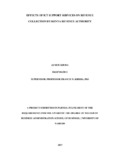| dc.description.abstract | Over the years, Kenya Revenue Authority (KRA) revenue collection has increased from its inception, accounting for over 93% of total government revenue. The impetus of the study is based around three relevant theories; institutional theory, change management theory and theory of systems. The challenges affecting revenue collection are over employment leading to supervision problems and budget constraints, non-payment of taxes by local community, administrative problems like corruption and lack of enforcement on revenue collection by local authorities, lack of administrative capacity to fully tap revenue sources among others. The main aim of the study was to explore the effects of ICT support services on revenue collection at KRA. This study used a descriptive survey research design. Primary qualitative data was used in this study specifically by use of interview guide. It was collected from all the six departments at KRA. Interviews were conducted from 6 selected departments where each department two employees were selected in the top management category to be precise the commissioner and deputy commissioner. Data collected was purely qualitative in nature therefore content analysis was used for data analysis since it involves discussion and was presented in prose. The study findings revealed that ICT support services have greatly influenced the revenue collection at KRA. This has been made possible by the strategies that the organization has put in place over the years by modernisation of revenue collection system through the introduction of iTax platform, I Customs, ICMS, manifest management system all these have aided in the automation of customs procedures. The study further concludes that automation of revenue collection processes offers great deal of significant management since it facilitates effective access to services and provides convenient and fast customer feedbacks. The study concludes that the level of compliance has increased among the tax payers due to the strategies that KRA is putting in place such as ensuring all companies registered obtain a PIN, all employers during recruitment process to enquire for tax compliance certificates, blocking of tax defaulters and also opening of service agents who can handle customers conveniently at different localities not necessarily at KRA offices like Huduma Centres. ICT development is of core importance to many organizations in need of growing successfully and improves efficiency in operations and in serving clients. More training on the reforms and modernization at KRA should be enhanced so as to improve on the skills, knowledge and professional capacity of the employees to increase revenue. In addition, more revenue collection centers need to be established since they have been effective in enhancing financial performance by the Authority. Given that the study focused only on strategic effect of ICT support services on revenue collection based on primary qualitative data (interview guide) and focused on the management employees only, it is recommended that a similar study on the effect of ICT support services on revenue collection at KRA be undertaken to include other employees and tax payers as well. The study also recommends that another study can be carried out using other methods of data collection such as questionnaires to cater for large population and secondary data to cater for factual data on performance. | en_US |



